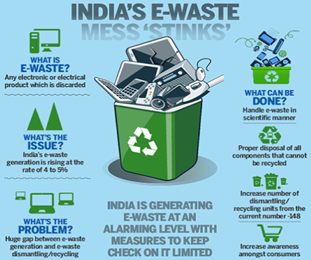Mains Daily Question
Dec. 4, 2019
Q. India is currently facing the issue of rising tsunami of e-waste. In this light discuss the challenges being posed by increasing e-waste and also suggest the suitable measures to tackle these challenges.
Structure of the answer:
- Introduction
- Rise of e-waste and issues relating to it
- Challenges posed by it
- Measures to handle such an issue
- Final analysis
Electronic waste/ e-waste is a term used for electronic products that have become unwanted, obsolete and have reached the end of their useful life. India generates near about 2 million metric tonne of e-waste annually and it would reach 5.2 mmt per annum by 2020. The main sources of e-waste in India are the government, public and private sectors, which account for almost 70% of total e-waste generation.
The rising e-waste pose multitude challenges in various forms such as:
- E-waste also impact human health as dismantling and shredding of it releases dust, toxins, dioxins
- There is huge gap between present recycling and collection facilities. According to ASSOCHAM study only 5% of the e-waste is formally recycled.
- Cross-border flow of waste equipment into India is another major issue. For ex- uncontrolled asbestos imports from Canada, used batteries from European nations
- Further, as per ASSOCHAM report (2014), about 5 lakh child labourers are engaged in e-waste activities and that too without adequate protection and safeguards.
- Unscientific method of recycling and lack of proper safety gear in handling e-waste leads to occupational health hazards.
- Finally, e-waste rules are blatantly violated and the informal sector remains unregulated.
To resolve the above issues, there is a need to adopt multiprong approach in following form:
- There is a need to strengthen the domestic legal framework to address the issue of unregulated imports of e-waste.
- Further, steps must be taken to formalize the informal sector by using strategy of incentivization.
- Governments must also encourage research for development of better environmentally sustainable e-waste recycling techniques.
- There is also a need of an effective take-back program for e-waste handling and collection.
Thus, in light of the above there is a need for creating a mass awareness programme to encourage consumers to reuse/ recycle electronic products. For ex- 'Take-back' and ‘Planet ke Rakwale’ campaign by Nokia.


